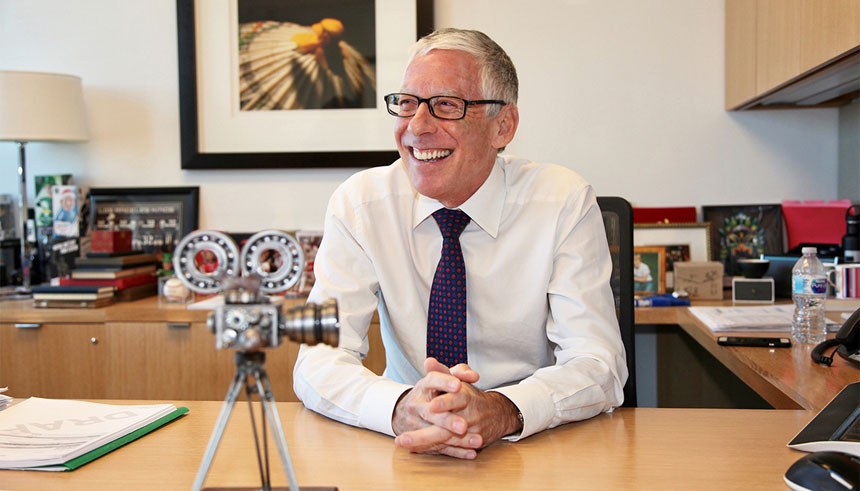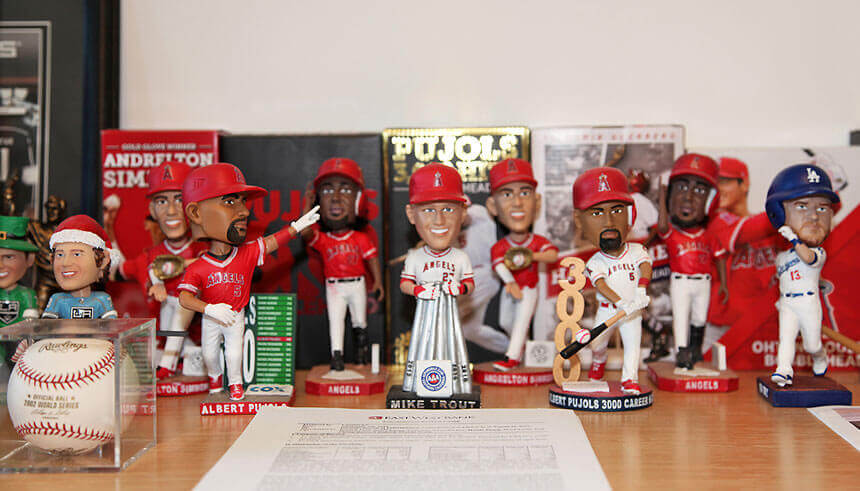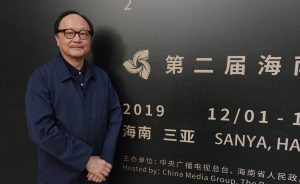East West Bank exec talks about growth, the future of Hollywood-China entertainment, and In N Out Burger.
With the ongoing trade negotiations and tariffs, the relationship between the United States and China has been tense—but that doesn’t mean business isn’t still flowing from both sides. With nearly 30 years in the banking industry, Bennett Pozil, executive vice president and head of corporate banking at East West Bank, knows how to find the right deals, whether that’s in entertainment or commercial banking.
“You need to find deals that make sense,” shares Pozil. “Deals that are simple. Once things start getting complicated, they probably aren’t real.”
Pozil talks more about how he got into entertainment finance, how he manages cross-border teams and his outlook on the future of U.S.-China entertainment.
How did you get into banking and entertainment finance?
By accident. At Bank of America (BofA), I got into their commercial banking program. When I was going through the program, I realized, wow, this is my dream job—in all seriousness. I just felt that it tied into my strengths—it made me feel like I had purpose.
For entertainment, I had a friend about the same age. He was working for a company that was making a movie called Glengarry Glen Ross. They had a bank that was financing the movie, and the deal fell apart. Around this time, BofA wanted to explore this end of the business. We had this team meeting. There must have been 30 people in the room, and I was the youngest and the greenest. The guy who ran the group was asking if anybody had any leads. I kept raising my hand, and he would just ignore me. Finally, somebody said, “Well, Bennett’s raising his hand.” The guy said, “He’s too new, he doesn’t know anything!”
I mentioned what I had, and they go, “Ok, that could be something.” He basically took it away from me and gave it to somebody more experienced. I used that incident to motivate me to become knowledgeable and to be the banker that the team could rely on, so I then started to study the space, figured it out and started to put my own deals together. That’s how I got into it.
What was the process like building the cross-border entertainment financing group at East West Bank?
This is year number nine here, which means I’ve been doing this for almost 30 years. Just being able to build up an entertainment group from scratch in China and being able to connect that back here to our team in the U.S.—that was pretty phenomenal. That to me is something I will always be so happy about. It was an accomplishment that hasn’t been easy to build and hasn’t been easy to replicate. I take a lot of pride in being part of this larger team that’s been able to put that together.
The first time I went to mainland China was October 2011. Of course, I knew nobody. Some nice people set me up and connected different meetings for me. I’m thinking, “Ah, it’s so easy—piece of cake.” Literally, the day I came back to the States, I went to the Asia Society film conference to be on a panel. On the panel before me, there was a producer who was talking about the first time he went to China and how easy he thought it was—until the second time he went back to China, when he realized he absolutely knew nothing and that it wasn’t easy. That’s when it dawned on me that I really don’t know anything. That was a turning point, when I realized that you cannot just take the Western style and force that into China, but instead have to take the time to truly learn how banking works in China.
You also manage teams in both the U.S. and China. How do you effectively communicate across oceans and were there any challenges in managing people with different cultural backgrounds?
There’s a whole mixture of folks from a lot of different cross sections. We have a number of teammates who came through our training program and learned the business from the ground up. Some have worked in both locations in China and the U.S., and some have just worked in one. Sometimes I like to take a team member who’s based here in Pasadena and say, “Hey, go spend a summer in Beijing or Shanghai—go work with the team there.” Usually with those experiences, you get a much better idea of what their counterparts are going through every day.
In terms of the banking style, I think it’s somewhat easier here in the U.S. than it is in China. In China, there’s a different regulatory body; there are more requirements, especially from an administrative angle. It takes longer to do things in China than it does here. Just a simple account opening or wire transfer—you can do that in 15 minutes here, and sometimes in China it can take a few days.
When we first started the group, we obviously had more people here in the U.S., and we were borrowing people from other teams in China. People here would get frustrated because they were like, “Why is it taking you so long to do something?” But they went over and saw it firsthand, then they’re like, “Oh, I get it.” There’s just a lack of understanding. That then leads to better decision-making of how to allocate workflow, set expectations, and how you share.
The goal right now is for the entertainment team in China to be locally managed. I think it’s better for the team there, as it gets more people involved. The connection between the two teams is always there because they have so many shared customers and experiences. And by working together, they’re able to be a lot more efficient. Even though they report differently, they feel like they’re one team—I think that’s a measure of success.
How do you identify what would make a good cross-border partnership?
When I talk about it being simple, it’s something you can scale, something you can replicate.
Like a deal we’re doing right now—there’s a Chinese company called Starlight. They invested in Crazy Rich Asians. They’re making their own movie with a studio here in the U.S. We were able to put financing together for it. They happen to be doing it here in the U.S., and they’re doing it in a Western style. In essence, it’s simple because it fits the customary way of doing business.
The U.S.-China trade war has affected industries across the board. What’s the impact been like on Hollywood-China co-productions and entertainment?
Prior to the trade war, there were well-publicized internal issues in China with entertainment. There was a change in the regulatory body that approves broadcast and screening TV shows. There were a number of shows that initially had approval, but then the approval got denied, which was usually after somebody invested all the money for it. There were tax issues that came up, and budget issues, and thematic issues, in terms of what these stories should be about. I think a lot of that has been addressed, and I think there’s more consistency now with what people are making. We’ll see some companies that may not survive this era, but I think for the most part the worst is behind us.
Because of that factor, plus some capital controls over the last few years, there’s been less investment from Chinese companies offshore into Hollywood on a co-investing basis. Now, some of the cross-border drop off could be related to just the poor relations between the administrations, but I still view that to be temporary. Eventually in the United States, a new administration will come, either next year or the next five years, and hopefully will have a much more constructive view of working with China—and they should probably read Dominic’s op-eds and find a better way of working across the Pacific.
Despite the trade tensions, quite a few Hollywood films have done really well at the China box office this year. Do you think this trend will continue in the future?
For this year, there were just less local movies available to be released in China, although the latest crop of local films has done amazingly well at the Chinese box office. I think it was always known that for 2019 there would be more imports into China’s box office. The past year nobody knew what to make, or nobody knew what they could air. Plus, the settlement of the tax issue took a lot of liquidity out of the market. With the lack of liquidity, the uncertainty about what direction to go into, and some companies running out of money and needing to get bailouts, there wasn’t a lot of content that was created.
I hear for next year they already have a very crowded Chinese New Year, with I think 30 films vying for that space right now. While this year there was a slowdown in availability of films, I think next year there will be plenty of titles. We’ll see right now a shortage of content available for the satellite TV market, but I think that should pick up next year.
Aside from banking and starting up new cross-border departments, what do you like to do for fun?
I read a lot. I read about 24 books a year.
I love sports. Hockey, football, baseball, basketball—love them all. I used to play a lot, but I do more watching now than playing.
I like the competition, the hopefully good sportsmanship. You see what people are really like. When I was a kid, I was a pretty good tennis player and played a lot of tournaments. Most of the time, especially in the earlier rounds, you had to call your own lines. In a close match, are you going to give them the right call or are you going to pretend that the ball was out? You’ve got to basically call on yourself. It could be like a match point, and your opponent hits the ball so close to the line that you’re like, yeah I could call that out and no one would know—but you would know. And you make that right call, or you have an opponent that makes that right call—it just makes you feel good to do the right thing.
I like to eat. One of my favorite restaurants is a client—it’s called Bavel in downtown LA. There’s another interesting place in Koreatown. It’s not a Korean restaurant; it’s inside the Hotel Normandie, this little sliver of a restaurant called Le Comptoir. I think there’s 15 seats. It’s fantastic.
I came back yesterday after eight days in China, and I’m like, “Ok, I got to go find In N Out Burger—I got to get a burger and a shake.” The best cure for jet lag.
– This article orginally appeared on Reach Further, , East West Bank’s digital news magazine covering U.S.-China Business.







